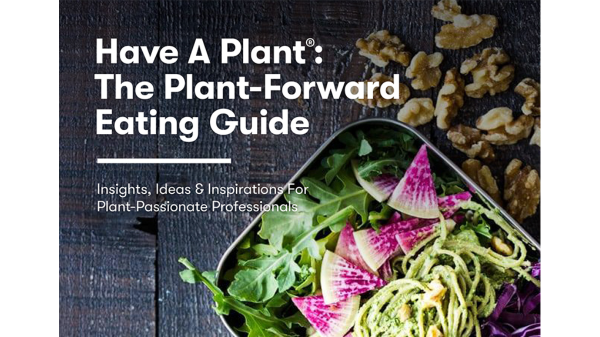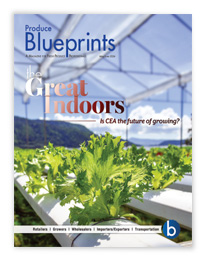Jan. 25, 2021 – The California Walnut Board, in partnership with the Produce for Better Health Foundation BB #:157162, announced today the launch of Have A Plant: The Plant-Forward Eating Guide.
While global health experts agree that eating more plants is the single most important action people can take to enjoy happier, healthier lives, nine out of 10 Americans aren’t eating enough fruits and vegetables.
California Walnuts and PBH created the guide and corresponding tools based on years of evidence to provide food and nutrition professionals with new resources to motivate more Americans to enjoy more fruits and vegetables, along with other deliciously nutritious plant foods, more often.
The Have A Plant: The Plant-Forward Eating Guide takes a novel approach to solving the long-standing plant consumption gap by providing the industry with a framework to create lasting change: the PBH KNOW-FEEL-DO Behavioral Framework.
“Our research tells us that simply educating on the facts doesn’t move the needle for healthy eating. Most Americans KNOW that eating plant foods, like fruits and vegetables, promotes health but that doesn’t always translate to action. To bridge consumers’ intention-action gap, we must inspire Americans with EASY ideas that makes the DOing simple, so they FEEL empowered and excited about how plant foods boost their health and happiness and add even more flavor to their favorite meals and snacks,” says Wendy Reinhardt Kapsak, MS, RDN, President and CEO, PBH.
“Have A Plant: The Plant Forward Eating Guide and PBH’s KNOW-FEEL-DO Behavioral Framework do just that – making it easy and more enjoyable to eat more plants, more often.”
In addition to the framework, the guide puts forward definitions for the industry to adopt when it comes to “plant-based” and “plant-forward.” With consumers increasingly bombarded with conflicting health messages and maddening diet noise, universal industry standard terms provide a common ground – ultimately helping cut through the confusion and encourage a style of eating that prioritizes plants without excluding other food groups.
Plant-forward eating, which includes the consumption of fruits and vegetables at recommended levels and higher intake of nuts such as walnuts , has been associated with a myriad of health benefits including a reduced risk of all causes of mortality, including cardiovascular disease (CVD) and cancer.
Research shows that eating more plants may also help improve gut health, which is the starting place for many other benefits, such as a healthy immune system and overall health.
One plant not to be overlooked is the walnut. A one-ounce handful is a powerhouse of important nutrients for optimum health, including protein (4g), fiber (2g) and a good source of magnesium (45mg). Heart-healthy walnuts are also the only nut significantly high in essential plant-based omega-3 ALA, an essential plant-based fatty acid that must come from food, with 2.5 grams per ounce.
“Walnuts aren’t always thought of as a plant but play an important role in a plant-forward diet, not only with their unique nutritional profile but also the satisfying taste and versatility they bring to any meal or snack,” says Michelle Connelly, Executive Director at the California Walnut Board.
“The California Walnut Board developed the Have A Plant: The Plant-Forward Eating Guide in partnership with PBH to help cut through the confusion on this topic and provide a useful resource for professionals and consumers when it comes to plant-forward eating. Because at the end the day, eating more plants should be practical, easy and enjoyable.”
The Have A Plant: The Plant-Forward Eating Guide is available today (fruitsandveggies.org/plant-forward-eating-guide) for industry and health professionals and includes:
• Definitions and infographics for use when talking with consumers;
• Implications and opportunities for plant-forward menus at restaurants, including culinary and tasting experiences;
• Trends and insights to showcase plant-forward shopper solutions in retail; and
• A Digital Toolkit, which includes recipes, infographics and a social media playbook for professionals.
For more plant-forward inspiration, visit www.walnuts.org/plant-forward-eating and www.fruitsandveggies.org.
About the Produce for Better Health Foundation
Produce for Better Health Foundation (PBH), a nonprofit 501(c)(3), is the only national organization dedicated to helping consumers live happier, healthier lives by eating more fruits and vegetables, including fresh, frozen, canned, dried and 100% juice, every single day.
California Walnut Board
The California Walnut Board was established in 1948 to represent the walnut growers and handlers of California. The CWB is funded by mandatory assessments of the handlers. The CWB is governed by a Federal Walnut Marketing Order. The CWB promotes usage of walnuts in the United States through publicity and educational programs. The CWB also provides funding for walnut production, food safety and post-harvest research.
CONTACT:
Katie Calligaro, Marketing & Communications Director
Produce for Better Health Foundation
kcalligaro@pbhfoundation.org
412-848-1644



